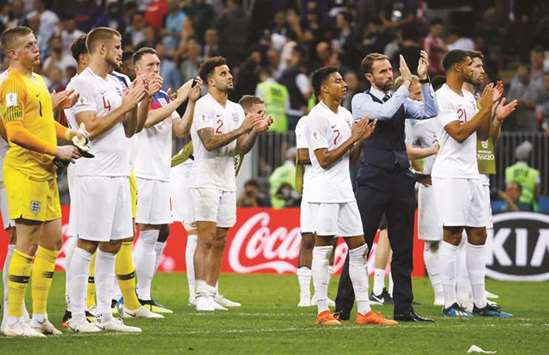Leave the flags out. Have another glass. Take another look, if you can, at those moments from Kaliningrad to Moscow when this capable England team played above itself and turned a drowsy, toxic summer back home into something else.
Let’s not have any anguish this time. England’s four and a half weeks at the World Cup deserves a little better, even after a 2-1 defeat by Croatia in Moscow that was decided deep into extra time.
And no tears even at the memory of that goalscoring start when for a few moments the planes flew backward through the sky, the cats barked, the police horses meowed and England did seem to be heading towards their first World Cup final on foreign soil.
Gareth Southgate’s team played to their limits at the Luzhniki Stadium, as they had against Colombia and against Tunisia all those millions of years ago in the midge-mists of Volgograd.
In the end England found a superior opponent here, a team with deeper gears and with a mania to run right to the end. Croatia came out like warriors in the second half, the craft and winning habits of Luka Modric and Ivan Rakitic starting to intrude like a firm hand on the elbow as the game ticked down.
By the start of extra time it was a case of counting who could still run. England looked done, cooked. Harry Kane limped gamely. Jordan Henderson kept on chugging about like a cavalry captain on a dying pony. Jesse Lingard and Dele Alli found weird depths of energy, running on fumes.
The Luzhniki had been full to capacity at kick-off, the light above the lip of the roof fading to powder blue. The crowd was swollen by 10,000 England fans who made it here by lay-overs and nights spent on airport benches, and who pegged out the bed-sheet bivouac at one end, the familiar pageantry of painted flags, a tour of Albion from Exeter to Hartlepool.
With five minutes gone the evening seemed to be heading their way. Alli was fouled on the edge of the box. Kieran Trippier has been getting closer all tournament. As the ball dipped and curled and bulged the net the air seemed to rush out through the roof, then rush right back in as England’s fans basked and bumped and rolled over each other in puppyish joy.
For 20 minutes this felt like England’s game. On the touchline Gareth Southgate looked calm, striding about in his waistcoat, stroking his whiskery chin and resembling once again a very clever cartoon badger who drives an old-fashioned car and plays the violin.
Raheem Sterling ran hard but lacked edge. Harry Kane missed a chance he would normally gorge himself on like a starving man. And at half-time and 1-0 up England really did seem to have one foot jammed in the door for a return to this stadium on Sunday.
Except they didn’t start again after the break. Croatia were suddenly driving the game, pressing England back on the flanks, finding holes that had previously been concealed. The equaliser came from the right, Ivan Perisic sticking a leg up above Kyle Walker’s dipped head to deflect the ball in.
On we went into a bruising, draining extra time. The goal felt like it was coming, even before Mario Mandzukic peeled off the back of John Stones and finished smartly.
And so: exit music. England’s World Cup summer is done. How will we remember those four weeks spent watching Harry and Dele and Harry from the dust of Samara to the semi-detached oddity of Kaliningrad?
Above all, this has been a dreamy, all-consuming piece of escapism. In tough times back home football has felt like a warm embrace, like a rush of chemical pleasure, like the best night out you’ve had in ages.
There will, of course, be that urge to give all this some wider meaning. It has been an odd feature of England’s progress at this tournament that so many have latched on to the idea of a moral dimension to victory, the notion that England have won matches because their methods are righteous, their hearts pure, and not, say, because Mateus Uribe didn’t hit his penalty kick two inches lower at the Spartak Stadium.
Sport is a chimera, it drags stories along in its wake. Champions are often blackguards. Losers are often nice. Sport and its storylines are just a decoration, a picture on the wall.
But it can still provide something uplifting. It is hard not to feel part of the enthusiasm for this team comes from a feeling of relief. A lot of young English people have been told for the last few years that times are hard, that their lives are set one way and that things were always, always better in the past.
Watching this England team – and yes, it is of course just a football team – has seemed to provide a different kind of script. A young, unheralded bunch of players have gone further than those before who were more obviously talented, more golden, more authentic, finding ways to succeed through teamwork and energy and a refusal to be cowed.
It is hopeful to see this, to look at Alli or Harry Maguire or Jordan Pickford and say, well, people told them that they probably couldn’t do it either.
Football isn’t real life. It is a separate world packed with hammy emotions and big fat wet notes of drama, always straining to mean a great deal more than it does. But it can provide a little inspiration along the way, another kind of story. England in a semi-final, with a likeable team led by the great Gareth, has been exactly this. No tears this time. There is St Petersburg on Saturday to follow. But they are, finally, coming home.

England manager Gareth Southgate and his players applaud fans after the World Cup semi-final loss to Croatia at Luzhniki Stadium in Moscow on Wednesday. (Reuters)
